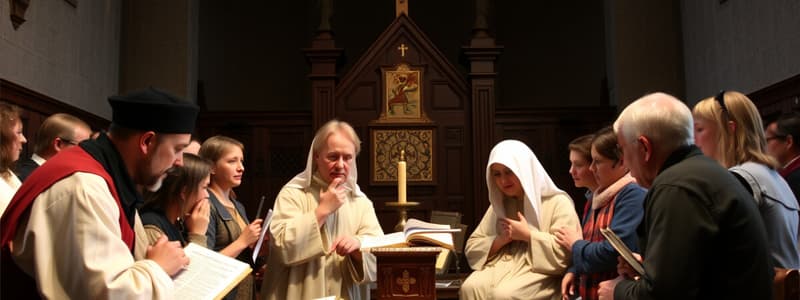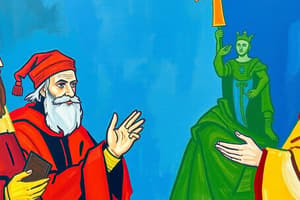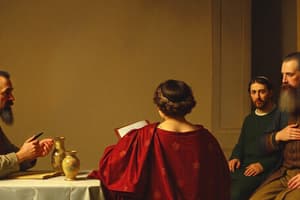Podcast
Questions and Answers
Ignatius de Loyola founded the Society of Jesus to promote humanistic ideals.
Ignatius de Loyola founded the Society of Jesus to promote humanistic ideals.
True (A)
Mary I's reign is characterized by her tolerance towards religious dissenters.
Mary I's reign is characterized by her tolerance towards religious dissenters.
False (B)
Mary I was the daughter of Catherine of Aragon and became queen after the death of her brother.
Mary I was the daughter of Catherine of Aragon and became queen after the death of her brother.
True (A)
During Mary's reign, being burned at the stake was an unusual punishment for heresy.
During Mary's reign, being burned at the stake was an unusual punishment for heresy.
The Spanish Inquisition was primarily focused on enforcing Catholic laws through dialogue.
The Spanish Inquisition was primarily focused on enforcing Catholic laws through dialogue.
Queen Mary I's harsh actions against Protestants were motivated by her desire to solidify Catholicism in England.
Queen Mary I's harsh actions against Protestants were motivated by her desire to solidify Catholicism in England.
A total of 356 people were burned at the stake during Mary I's reign.
A total of 356 people were burned at the stake during Mary I's reign.
Ignatius of Loyola trained his followers to spread the message of the Catholic Church through good deeds.
Ignatius of Loyola trained his followers to spread the message of the Catholic Church through good deeds.
The Spanish Inquisition was established to promote the Protestant faith in Spain.
The Spanish Inquisition was established to promote the Protestant faith in Spain.
The Inquisition allowed citizens to confess to heresy voluntarily to avoid severe punishments.
The Inquisition allowed citizens to confess to heresy voluntarily to avoid severe punishments.
The Spanish Inquisition resulted in an increase in skilled workers in Spain.
The Spanish Inquisition resulted in an increase in skilled workers in Spain.
During the Reformation, both Catholics and Protestants believed they were justified in their actions.
During the Reformation, both Catholics and Protestants believed they were justified in their actions.
The Spanish monarchy gained no power through the workings of the Inquisition.
The Spanish monarchy gained no power through the workings of the Inquisition.
The Counter Reformation aimed to reduce the influence of Protestantism in Europe.
The Counter Reformation aimed to reduce the influence of Protestantism in Europe.
The Council of Trent denied the existence of Purgatory.
The Council of Trent denied the existence of Purgatory.
The Protestant Reformation led to the establishment of public or secondary schools using Greek and Latin for instruction.
The Protestant Reformation led to the establishment of public or secondary schools using Greek and Latin for instruction.
Transubstantiation refers to the belief in the literal transformation of bread and wine during the Eucharist.
Transubstantiation refers to the belief in the literal transformation of bread and wine during the Eucharist.
The Jesuit Order was founded by St.Ignatius de Loyola to promote religious renewal.
The Jesuit Order was founded by St.Ignatius de Loyola to promote religious renewal.
Celibacy was maintained as a traditional view of marriage during the Protestant Reformation.
Celibacy was maintained as a traditional view of marriage during the Protestant Reformation.
No new religious orders were founded during the Reformation period.
No new religious orders were founded during the Reformation period.
The Catholic Church maintained that human beings could redeem themselves through good works and sacraments.
The Catholic Church maintained that human beings could redeem themselves through good works and sacraments.
Flashcards are hidden until you start studying
Study Notes
Reformation Overview
- Religion serves as a significant way of life for many.
- Catholicism grew due to historical context and societal influences, particularly during the Renaissance.
Effects of the Protestant Reformation
- Education expanded through public or secondary schools, emphasizing Greek and Latin.
- Shift in marriage views: abolished clerical celibacy; husbands seen as rulers, wives as obedient partners and child-bearers.
Counter-Reformation
- Initiated by the Catholic Church in response to Protestantism, aimed at regaining loyalty and followers.
Council of Trent
- Established to clarify Catholic doctrine and reinforce beliefs.
- Affirmed the Doctrine of Merit, enabling redemption through good works and sacraments.
- Affirmed the existence of Purgatory and the role of prayer and indulgences in reducing purgatorial time.
- Reaffirmed beliefs in transubstantiation and the significance of the seven sacraments.
- Reaffirmed the authority of Scripture and Church traditions.
Early Calls for Reform
- Criticism of Renaissance popes and clergy led to calls for reform.
- Notable figures include St. Teresa of Ávila and the Jesuit order founded by St. Ignatius of Loyola.
Jesuits
- Founded by Ignatius of Loyola, aimed to spread Catholic teachings.
- Emphasized humanistic education and advised nobility.
- Played a key role in globalizing Catholicism, particularly in Asia.
Queen Mary I
- Devout Catholic daughter of Catherine of Aragon, faced challenges after her father’s divorce.
- Restored Catholic faith in England after ascending the throne.
Marian Persecutions
- Nicknamed "Bloody Mary" for executing over 300 dissenters during her reign.
- Execution methods included burning at the stake, tied to her efforts to enforce Catholicism.
Spanish Inquisition
- Established to judge suspected heretics, particularly Protestants.
- Inquisitors offered citizens chances to confess; non-confession led to torture or execution.
Effects of the Spanish Inquisition
- Strengthened monarchical power in Spain while promoting religious uniformity.
- Protestantism was largely eradicated; however, expulsion of Jews and Muslims caused a skilled labor deficit.
Historical Context
- The Reformation was a tumultuous period marked by violent conflicts between Catholics and Protestants, each side convinced of its righteousness.
Studying That Suits You
Use AI to generate personalized quizzes and flashcards to suit your learning preferences.





